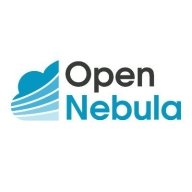

OpenNebula and Spacelift compete in the cloud infrastructure management domain. OpenNebula holds an advantage in terms of cost-effectiveness and community support, whereas Spacelift is superior in automation and integration capabilities.
Features: OpenNebula provides simplicity in virtualization management, supporting a wide range of hypervisors and offering seamless onboarding. Its open-source nature and community support are valuable. Spacelift excels with advanced automation features, continuous integration and delivery tools, and a focus on infrastructure as code, making it appealing for modern DevOps environments.
Room for Improvement: OpenNebula could enhance integration with more modern DevOps tools and expand its feature set to compete with proprietary solutions. Improving user interface design might increase usability. Spacelift could lower its pricing to be more competitive and simplify initial setup processes for new users. Providing more comprehensive documentation can assist enterprises encountering complex setups.
Ease of Deployment and Customer Service: OpenNebula offers straightforward deployment with strong community-driven support ideal for organizations seeking open-source solutions. Spacelift, on the other hand, provides a scalable deployment model with dedicated customer service aimed at complex enterprise needs, emphasizing personalized assistance.
Pricing and ROI: OpenNebula appeals to cost-sensitive organizations with its low setup costs and flexible expansion options, providing significant ROI by saving on licensing fees. Spacelift's higher pricing reflects its premium features and focuses on long-term value for companies prioritizing scalability and modernization, potentially offering substantial ROI for those needing advanced cloud management capabilities.
| Product | Market Share (%) |
|---|---|
| OpenNebula | 3.7% |
| Spacelift | 1.2% |
| Other | 95.1% |


| Company Size | Count |
|---|---|
| Small Business | 7 |
| Midsize Enterprise | 6 |
| Large Enterprise | 3 |
OpenNebula provides the most simple but feature-rich and flexible solution for the comprehensive management of virtualized data centers to enable private, public and hybrid IaaS clouds. OpenNebula interoperability makes cloud an evolution by leveraging existing IT assets, protecting your investments, and avoiding vendor lock-in.
OpenNebula is a turnkey enterprise-ready solution that includes all the features needed to provide an on-premises (private) cloud offering, and to offer public cloud services.
Spacelift provides a sophisticated infrastructure management platform with key features such as Drift Detection and Terraform integration, simplifying complex deployments and enhancing user workflows through an intuitive interface.
Spacelift excels in modernizing infrastructure management by integrating smoothly with Terraform, using a pull request-based approach for visibility into logs. It automates change detection using GitOps from GitHub and supports AWS connectivity with credential management. Despite its strengths, some users find room for improvement in supporting smaller enterprises and offering more seamless cloud integrations with self-hosted versions. Handling of HashiCorp Vault secrets and cumbersome notification webhooks may require additional setup effort.
What are the most valuable features?In specific industries, Spacelift is primarily utilized for infrastructure management and deployment across platforms like AWS, Azure, and GCP. In banking architecture, it replaces Terraform Enterprise, ensuring secure and efficient operations. Projects like Google Fiber benefit from its capability to import and manage data effectively, engaging users with HashiCorp Language and GitHub for CI/CD integration.
We monitor all Cloud Management reviews to prevent fraudulent reviews and keep review quality high. We do not post reviews by company employees or direct competitors. We validate each review for authenticity via cross-reference with LinkedIn, and personal follow-up with the reviewer when necessary.